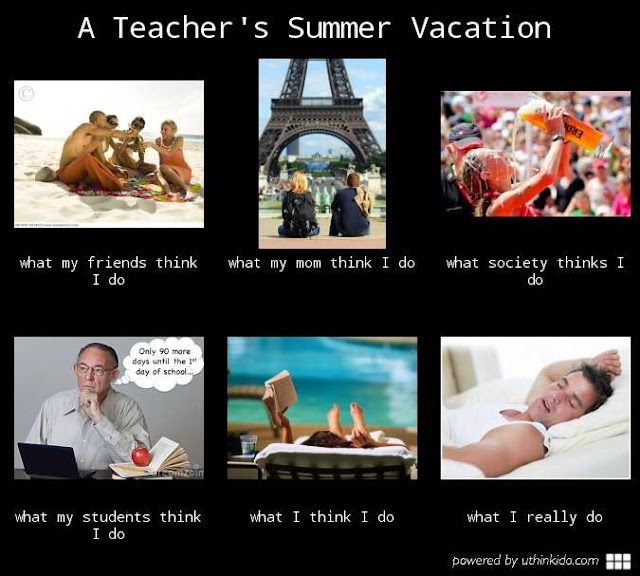 |
| hilar....and pretty accurate : ) |
Either way, at some point you'll have to start to think about your classroom and setting up your Reading Workshop, so when you're ready, good info awaits!
If you're not familiar with Reading Workshop, here it is in Cliff's Notes:
10-15 minute mini-lesson
25-30 minute workshop
10-15 minute share time
The teacher will be meeting with the whole class during the mini-lesson and share time, but during the workshop time, kiddos are off working with their "tools" (books, notebooks, pens and pencils, the classroom library, perhaps a laptop or iPad for blogging or researching what to read next). While students work, the teacher will be conferring 1:1 with kiddos or holding guided reading groups.
Here's the thing though - if your kids aren't taught how to work effectively during workshop, the teacher will never be freed up to work with individuals or small groups.
It's crucial to the Reading Workshop that the teacher takes his or her time to set up the procedures and expectations of the workshop. This means spending a good five weeks simply teaching kids how to read independently, with a partner, what to do when they finish a book....etc.
You have to go slow during these five weeks so you can accelerate your individualized instruction over the rest of the school year that follows. Also, the kids need to see and feel how important reading is to their teacher, and they can't do this without having time dedicated to it. We put effort and time into what we value. How will kids learn the value of reading if they are never given time to do so?
In the past, I have followed Fountas and Pinnell's First 20 Days of Reading. (This can be found in their book Guiding Readers and Writers, Grades 3 - 6.) Four weeks of mini-lesson plans cover these topics and more:
- Using the classroom library
- Selecting a book
- Abandoning books
- What to do when you finish reading
- How to think about and respond to the books you read
- Genres
These lessons are definitely appropriate all the way up through seventh and eighth grade. I didn't do all the the first 20 days lessons, but most of them. I also didn't worry about getting to my content right away - this is the go slow to go fast part. If I am going to expect my students to read independently all year for me, inside and outside of my classroom, I have to thoroughly teach them how to do so. The content will come. You have to teach the independent reading slowly in the beginning.
 This summer I read The Daily Five (Boushey & Moser). This book is an even more in depth look at teaching students how to work independently in the Reading Workshop. While this book is a great read for any reading teacher, it is particularly great for younger students, as it covers the topics listed above, in addition to:
This summer I read The Daily Five (Boushey & Moser). This book is an even more in depth look at teaching students how to work independently in the Reading Workshop. While this book is a great read for any reading teacher, it is particularly great for younger students, as it covers the topics listed above, in addition to:- Different ways to read a book
- Where to sit
- Building stamina
Here's the good news: when you slow down and teach your kids how to read and be in charge of their independent reading, it carries them through the year. Kids need to read voluminous amounts of text in all different genres - and they can't do that if they do not know how to pick Just Right books and what to do when they finish or get stuck.
Then, after they have been thoroughly taught how to do independent work in your classroom, you will be free to "go fast," hitting the ground running with all the content you need to cover.
The good news is, once your class knows the expectations of the workshop portion of Reader's Workshop each day, and once they get into the routines and have a year's worth of practice, you will get data like this:
While standardized test scores are important and a fact of life, this is the data that always keeps me coming back to my practice and working on improving it in all the ways I can. Kids telling me they love reading and have favorite books and authors, and having them be sooo picky about their books because they now know exactly what they like - I think that's the mark of great instruction. Creating life long readers - that drives my passion and love of literacy instruction.
So, take your time in the first month of school. Even if you feel like you've got to get to your standards - trust me on this one - it will come in good time.
Is there anything unique you do in the beginning of the school year to teach your kiddos about independent reading? Be sure to share your ideas here!
Happy Monday!



.jpg)






















0 comments:
Post a Comment